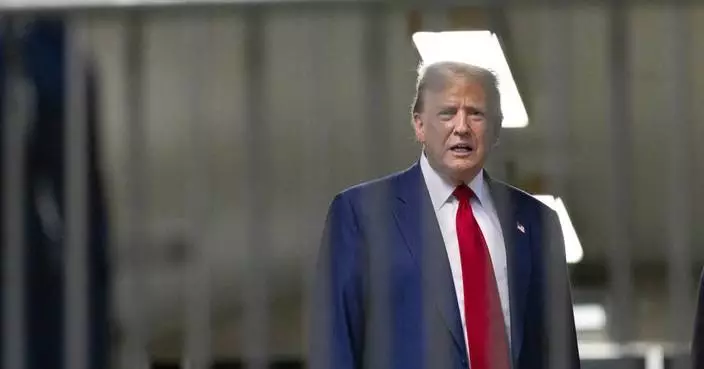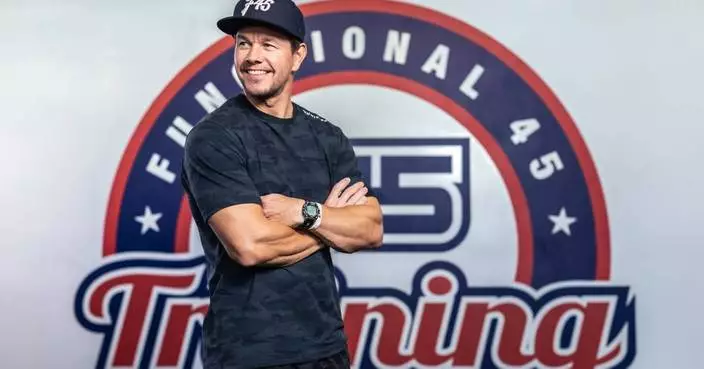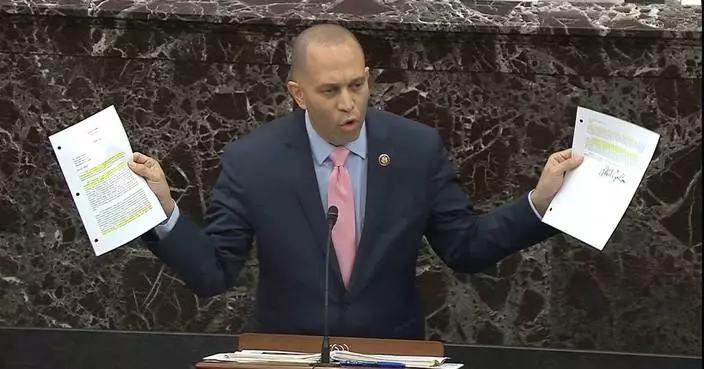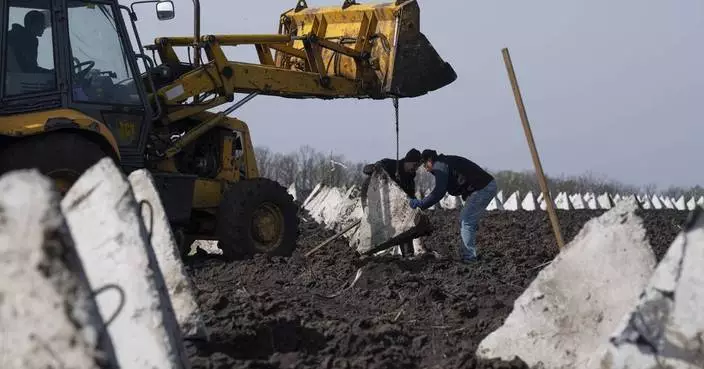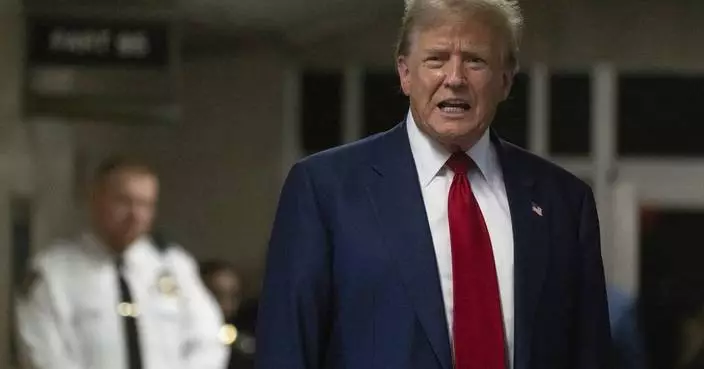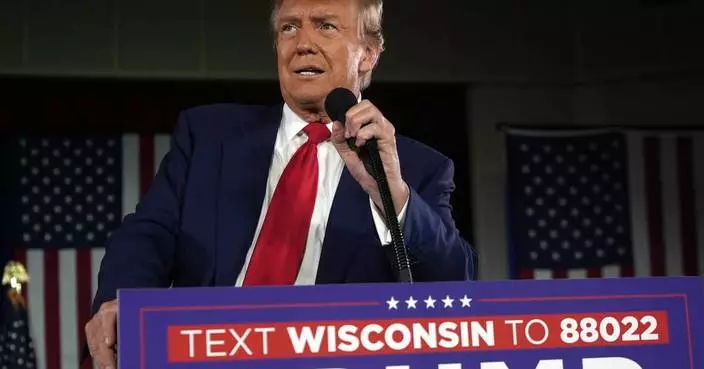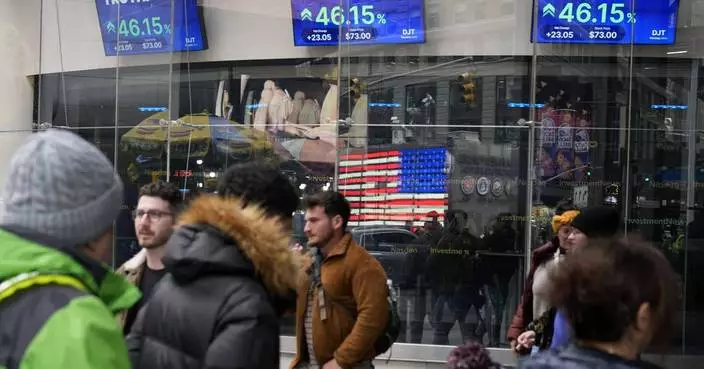Donald Trump and Vladimir Putin may have reached several historic agreements at their summit in Finland this week. Or, they may not have. It depends on who you talk to. Three days later no one was quite sure.
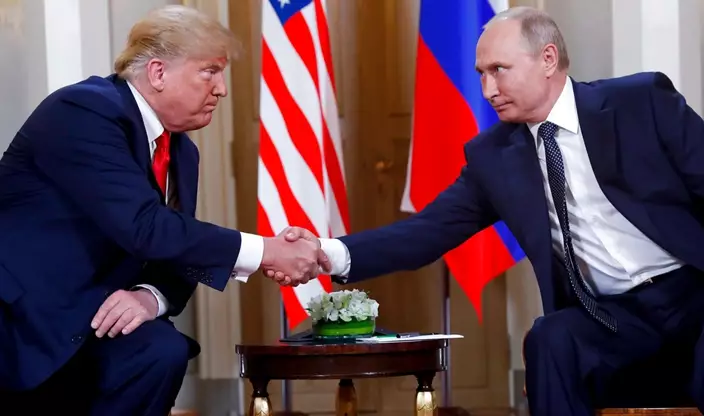
In this July 16, 2018, photo, U.S. President Donald Trump, left, and Russian President Vladimir Putin, right, shake hands at the beginning of a meeting at the Presidential Palace in Helsinki, Finland. Trump and Putin may have reached several historic agreements at their summit in Finland this week. Or, they may not have. Three days later no one is quite sure. With no details emerging from the leaders’ one-on-one discussion on Monday other than the vague outline they offered themselves, officials, lawmakers and the public in the United States in particular are wondering what, if anything, was actually agreed to. (AP Photo/Pablo Martinez Monsivais)
With no details emerging from the leaders' one-on-one discussion on Monday — other than the vague outline they offered themselves — officials, lawmakers and citizens in the U.S. in particular are wondering what, if anything, was actually agreed to. Both Trump and Putin have declared the meeting a grand success that is soon to reap great rewards in numerous geopolitical realms, yet even the most complete accounting of the talks — one provided by Putin — suggests that any outcomes are far from certain.
And, the fact that a high-profile, high-stakes summit between the commanders in chief of the world's two biggest nuclear powers could be held without a solid achievement or failure to point to has flummoxed many.
In the U.S., frustration with the lack of information has raised already heightened suspicions of Trump. Democratic lawmakers have pushed to subpoena the notes of the State Department interpreter who translated for Trump or compel her to testify. Republicans have blocked the move. Officials said Thursday the White House and State Department were also likely to fight such a move as a breach of executive authority, making the appearance of the notes unlikely until they are published in a historical record decades from now.
So for now, everyone but Trump and Putin and perhaps a handful of their close confidants are in the dark. Even Trump's own intelligence chief, Dan Coats, said Thursday, "I don't know what happened in that meeting."
"It is utterly amazing, utterly amazing, that no one knows what was said," Chuck Schumer, the top-ranking Democrat in the Senate, said. "This is a democracy. If your president makes agreements with one of our leading — if not our leading — adversary, his Cabinet has to know about it and so do the American people."
Typically, a summit, especially one between two major powers, will occur after weeks and months of meticulous planning at lower levels with an eye toward producing demonstrable results. Agenda topics, talking points, desired outcomes and even major portions of significant agreements are normally negotiated in advance so the relevant agencies of both countries are aware of any potential policy changes. In some cases, the actual summit meeting and leaders' signatures on a piece of paper or a joint communique are mere formalities as the hard work has already been done by subordinates.
Those conventions have been upended by Trump's buccaneering approach to affairs of state — the kind of approach he thinks worked in his landmark summit with North Korean leader Kim Jong Un last month. But this time there was no joint statement to formalize the outcome of the talks — just a meandering, 45-minute press conference where Trump stoked controversy by appearing to side with Putin over U.S. intelligence agencies' assessment that Russia meddled in the 2016 election.
Russia's ambassador to the U.S., Anatoly Antonov, expressed hope Thursday that "the verbal agreements between Putin and Trump will be fulfilled" — though the substance of any such understandings remain murky, not least because the main business was conducted in the two hours of discussions between the two leaders with only translators joining them.
On Thursday, the Trump administration poured cold water on at least one proposal from Putin: that Russia be allowed to interview Americans the Kremlin accused of crimes — the quid pro quo for allowing U.S. investigators to interrogate Russian intelligence officials recently indicted in the U.S. for alleged election interference.
"That's not going to happen," Secretary of State Mike Pompeo said of the Russian proposal in an interview with the Christian Broadcasting Network.
Still, from Putin's perspective, the summit put Moscow and Washington on "the path to positive change." In recent days he has spoken of finding broad consensus with Trump on ensuring security along Syria's border with Israel and on arms control issues. Russia's defense and foreign ministries, meanwhile, have both said they are ready to start putting those agreements into action.
Trump himself has also put a positive spin on the summit. He says a second meeting with Putin will usher in the implementation of the laundry list of items they discussed in Helsinki. Those, he said in a tweet, include terrorism, security for Israel, nuclear proliferation, cyberattacks, trade, Ukraine, Middle East peace and North Korea. "There are many answers, some easy and some hard, to these problems ... but they can ALL be solved!" he said.
Pressed for details, however, the White House could not provide any.
Press secretary Sarah Huckabee Sanders mentioned Syria, Iran, Israel, arms control, Russia's annexation of Crimea from Ukraine and its meddling in 2016 U.S. election as having been discussed. But turning those issues from topics of discussion into action apparently remains a work in progress.
"This is the beginning of the dialogue with Russia and our administration and theirs and we're going to continue working through those things," she told reporters at the White House on Wednesday.
Just minutes later, the State Department offered its own take on the Helsinki meeting, saying that no agreements were reached; just general proposals on matters mainly related to economic and strategic cooperation.
Spokeswoman Heather Nauert said three proposals were made: one for a high-level working group with U.S. and Russian business leaders to be convened; another for the creation of an "expert council" of academics, current and former diplomats and military officials from both countries to look broadly at U.S.-Russia relations, and a third one for the U.S. and Russian national security councils to hold a series of follow-on meetings.
"You know, these are certainly all modest proposals," she said. "The president had said going into this that we wouldn't solve all the world's problems in one meeting, in one conversation with the Russian government but we think it's a pretty good place to start."
At the Pentagon, officials were still waiting to see if their marching orders in Syria would change as a result of the summit.
The commander of U.S. forces in the Middle East said Thursday he had not received new guidance from the Pentagon on cooperating with Russia in Syria.
"We have received no further direction than we've currently been operating under," Gen. Joseph Votel said in a video-teleconference from his headquarters in Tampa, Florida. He said he's taking a "steady-as-she-goes" approach in Syria in the absence of new instructions.
NEW YORK (AP) — Lawyer Keith Davidson concluded his testimony in Donald Trump's hush money trial late Thursday afternoon after spending about 6 1/2 hours on the witness stand over two days. Prosecutors then called to the stand a forensic analyst who works for the Manhattan district attorney's office.
Thursday's proceedings began with another contempt hearing over whether the former president violated his gag order again.
Judge Juan M. Merchan heard from both prosecutors and one of Trump's defense attorneys about four more prospective violations, including comments Trump made about the political makeup of the jury and comments he made to reporters in the courthouse hallway. No immediate decision on the potential sanctions was made.
The trial is in its 10th day.
Prosecutors have said that Trump and others conducted a scheme to illegally influence the 2016 election by purchasing and burying salacious stories that might hurt his campaign.
Trump is accused of falsifying internal business records to cover up hush money payments — including $130,000 given to porn actor Stormy Daniels by Cohen — recording them instead as legal expenses.
He has pleaded not guilty to 34 felony counts of falsifying business records.
The case is the first-ever criminal trial of a former U.S. president and the first of four prosecutions of Trump to reach a jury.
Currently:
— Key players: Who’s who at Donald Trump’s hush money criminal trial
— The hush money case is just one of Trump’s legal cases. See the others here
— Read the judge's full order on Donald Trump's gag order violations
— Trump calls judge ‘crooked’ after facing a warning of jail time if he violates a trial gag order
Here's the latest:
A forensic analyst who took the witness stand in Donald Trump's hush money case said that Michael Cohen had tens of thousands of contacts saved on his phone.
Douglas Daul testified that there were an eye-popping 39,745 contacts stored in Cohen’s phone.
“That is unusual. I have not seen that many contacts on a phone,” Daus told jurors, adding that he typically sees hundreds “maybe thousands” when analyzing cell phones.
Among the examples shown in court: Multiple pages worth of entries for Trump, ex-National Enquirer publisher David Pecker and the Trump Organization’s former longtime finance chief, Allen Weisselberg.
Daus also looked at photographs stored on Cohen’s cellphones, including one shown in court of the ex-Trump lawyer posing at the lectern in the White House press briefing room in February 2017.
The analyst said he’s never met Cohen.
But asked by prosecutor Christopher Conroy how he knows that’s him, Daus deadpanned: “I watch a lot of news.”
Prosecutors in Donald Trump's hush money case called Douglas Daus to the witness stand following the conclusion of Keith Davidson's testimony.
Daus is a forensic analyst from the Manhattan district attorney’s office who performed analyses on two iPhones that former Trump lawyer Michael Cohen turned over to authorities during the investigation.
Davidson was on the witness stand for about 6½ hours over two days.
Keith Davidson finished testifying Thursday afternoon after a few more questions from Trump lawyer Emil Bove during a portion of his testimony known as re-cross.
The defense lawyer focused again on portions of audio recordings of conversations Davidson had with Cohen in 2018, playing them aloud for the jury. The same clips had previously been played only for Davidson and the parties, but not the jury in Donald Trump's hush money case.
Bove used the recordings to amplify his contention that, contrary to Davidson’s testimony, Stormy Daniels had attempted to leverage Trump’s election to maximize her payday.
In one of the clips, Davidson could be heard saying that he recalled hearing Daniels screaming at him during the 2016 negotiations and telling him to settle as soon as possible because she feared she’d lose leverage if Trump lost.
During re-direct by the prosecution in Donald Trump's criminal trial, an audio recording of Michael Cohen and Keith Davidson was played aloud in court.
In the recording, Cohen could be heard telling Davidson about a conversation he’d had — with a person the witness said he believed to be Trump.
“I can’t even tell you how many times he said to me, ‘You know, I hate the fact that we did it.’ And my comment to him was, ‘But every person that you’ve spoken to told you it was the right move,’” Cohen said in the recording.
Davidson testified that he understood the comments were referring to Trump’s regret about the settlement with Daniels.
Elsewhere in the audio, Cohen can be heard fretting about his position within Trump’s orbit, telling Davidson: “Nobody’s thinking about Michael.”
“I mean, would you write a book? Would you break away from the entire, we’ll call it, Trump doctrine?” Cohen asked. “Would you go completely rogue?”
After a short break Thursday afternoon, Assistant District Attorney Joshua Steinglass launched a new round of questions at lawyer Keith Davidson during a phase of his testimony known as re-direct. That’s common in trials. Defense attorney Emil Bove will have a chance to ask more questions afterward.
During the break, Donald Trump stood behind the defense table and chatted with adviser Boris Epshteyn. Epshteyn stood at the rail separating the gallery from the area where the parties and lawyers sit.
As the two were talking, District Attorney Alvin Bragg entered the courtroom, passing behind Epshteyn and catching a look from Trump, before making his way to a seat on the other side of the gallery.
The defense in Donald Trump's hush money trial concluded its cross-examination of Keith Davidson by focusing on what’s not known about the Stormy Daniels agreement — namely what happened with it once it was sent to Michael Cohen and whether Trump ever signed it.
The document referred to Trump by a pseudonym, David Dennison, and had a spot on the signature page for “DD.” But the version that Davidson had, which was used as evidence at the trial, doesn’t show any signature in that space.
Trump attorney Emil Bove also focused on what he said was the common use of pseudonyms in such deals. Aside from referring to Trump as David Dennison, the document listed Daniels as Peggy Peterson.
“It’s common. You even used it with Hulk Hogan. Correct?” Bove asked Davidson. After a pause and some prodding, Davidson responded: “I believe so.”
After Keith Davidson was unable to recall details of certain conversations from years ago, Trump lawyer Emil Bove tried a new cross-examination tactic: confronting him with audio recordings of things he’s said in the past.
As he sat on the witness stand Thursday, Davidson listened, through headphones, to a 2018 conversation he’d had with Michael Cohen, in which he said Stormy Daniels was experiencing “settler’s remorse” over her deal with Cohen.
Bove said the remarks suggested Daniels was seeking to “create leverage over Donald Trump,” which Davidson disputed. He noted the conversation happened years after the settlement, as Daniels was weighing an offer of $1 million to get out of the agreement.
Though the recording was made surreptitiously by Cohen, Davidson said he had previously suspected that Cohen was taping their calls.
With Keith Davidson back on the stand for more cross-examination, Trump attorney Emil Bove zeroed in on his role in negotiating for the gossip blog “The Dirty” to delete a 2011 story that alleged Stormy Daniels had a sexual encounter with Donald Trump.
Bove quizzed Davidson about possible connections between Daniels’ agent and the people who made the post, and whether she had sought to have the post removed so she could negotiate a more lucrative deal elsewhere.
Davidson ended up sending a cease and desist letter to the blog to have the post taken down.
During his questioning, Bove accidentally dropped the binder full of material he’d been referencing. “That drop was catastrophic to my binder,” the defense lawyer quipped as he tried to regain his bearings.
Before Keith Davidson's testimony in Donald Trump's criminal trial resumed on Thursday, the judge rebuffed a defense request to rule in advance on whether the former president would violate his gag order by posting certain articles to his Truth Social account.
Trump lawyer Susan Necheles had asked Judge Juan M. Merchan to review the articles, written by legal scholars such as Jonathan Turley who are critical of his prosecution, and decide whether they would run afoul of a ban on commenting about people involved in the case.
She argued that the gag order, issued March 26, was somewhat ambiguous and that while she thought the articles were fine to post, she wasn’t sure.
Merchan said there “is no ambiguity, I believe, in the order,” citing an appeals court ruling upholding the commentary ban. The judge said he wouldn’t give advance rulings on what posts would and wouldn’t violate the gag order, advising Necheles: “When in doubt, steer clear.”
Court proceedings in Donald Trump's hush money trial resumed Thursday after a lunch break.
After returning to the courtroom, Trump sat at the defense table, chatting with lawyer Todd Blanche and reviewing a stack of photographs of what appears to be a crowd at a political rally.
Lawyer Keith Davidson is expected to return to the stand as cross-examination resumes.
Defense attorney Emil Bove was visibly frustrated at times while questioning Keith Davidson in Donald Trump's hush money trial on Thursday, raising his voice as the hush money negotiator refused to answer certain questions about his previous work securing settlements for clients to suppress embarrassing information about other celebrities.
Bove twice sought Judge Juan M. Merchan’s help to compel answers from Davidson, who said he either does not remember the deals or isn’t authorized to speak about them.
Merchan refused.
After Davidson invoked attorney-client privilege in response to questions about past deals, one of several times he did so, Bove shot back: “We’re both lawyers. I’m not here to play lawyer games with you.” Bove later suggested Davidson’s memory was intentionally “fuzzy” around some of the more controversial settlements he worked on.
Bove’s style stands in contrast to Trump’s lead lawyer Todd Blanche, who has been more soft-spoken in his questioning and interactions with the judge.
Defense lawyer Emil Bove pressed Keith Davidson Thursday on his understanding of extortion law, grilling him about previous instances in which he solicited money to suppress embarrassing stories, including one involving wrestler Hulk Hogan.
By the time Davidson negotiated hush money payments for McDougal and Daniels, Bove suggested to the witness, “You were pretty well versed in coming right up to the line without committing extortion, right?”
“I had familiarized myself with the law,” Davidson replied.
Davidson was previously investigated by the FBI but not charged after he asked Hogan, whose real name is Terry Bollea, to pay his client $300,000 to head off the release of the wrestling star’s sex tape, portions of which ended up published by Gawker.
Bove noted Davidson also helped a client get paid $10,000 off the release of Lindsay Lohan’s private medical files. He also had a role in brokering a sex tape involving early 2000s MTV personality Tila Tequila.
As the defense began its cross-examination of Keith Davidson in Donald Trump's hush money trial, lawyer Emil Bove elicited testimony from Davidson that he’d never had any interactions with Trump — only Cohen.
The lawyer testified that he never met Trump, nor had he ever been in the same room as him until he began testifying in court on Tuesday.
Davidson said he was unfamiliar with the Trump Organization’s record-keeping practices — a key issue in the trial — though he did receive some emails from Cohen’s company email address.
Any impressions he had of the former president came through others, the lawyer testified.
Bove appeared to be underscoring the defense’s points that Trump was removed from the negotiations — that Cohen was handling the hush-money matters on his own — and that his testimony isn’t relevant to the charges at hand, which allege Trump falsified business records by logging reimbursement payments to Cohen as legal fees.
Before a short midday break, prosecutor Joshua Steinglass wrapped his questioning of Keith Davidson by asking about texts Michael Cohen sent, instructing him to prevent Stormy Daniels from doing interviews.
Cohen texted at one point that the “wise men think the story is dying” so she shouldn’t do any interviews, and any statements from her should come from Davidson.
Shortly after that exchange, which was shown on courtroom monitors, Daniels declined to appear on Sean Hannity’s Fox News show.
In another instance, Davidson issued a statement for Daniels again denying she’d had a sexual encounter with Trump, drafting it in a Hollywood hotel suite as she was getting ready to appear on Jimmy Kimmel’s late night show.
But Daniels then disavowed the statement on the show, noting that the signature on it didn’t match her own.
This enraged Cohen, who threatened to sue Daniels “to hell” and sent other threatening messages, Davidson testified.
“He can be a very aggressive guy,” he said.
Keith Davidson went to great lengths in testimony Thursday to defend a January 2018 statement he penned on behalf of Stormy Daniels denying a news report that Michael Cohen had paid $130,000 to silence her claims of a sexual encounter with Donald Trump.
For example, the statement’s claim that Daniels never had a “sexual and/or romantic affair with Donald Trump” could technically be true, Davidson contended, if you were to “hone in on the definition of romantic, sexual and affair.”
“I don’t think anyone has ever alleged that any interaction between she and Mr. Trump was romantic,” the lawyer testified, drawing a laugh from prosecutors.
Likewise, Davidson said, the denial about hush money payments could be considered factual, since the payments made to Daniels were, legally speaking, “consideration in a civil settlement.”
Trump had denied having a sexual encounter with Daniels.
Keith Davidson testified Thursday that Michael Cohen ranted to him about Donald Trump in a phone conversation about a month after the 2016 election, complaining the president-elect wasn’t taking him to Washington D.C. and hadn’t paid him back for the payment to Stormy Daniels.
“Jesus Christ, can you believe I’m not going to Washington?” Davidson recalled Cohen saying during the Dec. 9, 2016, call.
Davidson was doing some Christmas shopping at a California store that he said was bizarrely and memorably decorated in an “Alice in Wonderland”-type theme with representations of huge rabbits and a “Cat in the Hat” on the ceiling, amid other holiday decor.
“I’ve saved that guy’s ass so many times, you don’t even know,” Cohen continued, according to Davidson. Using an expletive, he said Trump “isn’t even paying me the $130,000 back.”
When it became clear on election night in 2016 that Donald Trump would be elected president, Keith Davidson texted then-National Enquirer editor Dylan Howard: “What have we done?” Howard responded: “oh my god.”
Explaining the message on the witness stand in Trump's hush money case Thursday, Davidson said, “This is sort of gallows humor. It was on election night as the results were coming in. There was sort of surprise among the broadcasters and others that Mr. Trump was leading in the polls and there was a growing sense that folks were about ready to call the election.”
“There was an understanding that our efforts may have in some way — strike that — our activities may have in some way assisted the presidential campaign of Donald Trump,” Davidson added.
Keith Davidson testified Thursday that Michael Cohen told him he and Trump were “very upset” when The Wall Street Journal published an article that exposed the hush money arrangement with former Playboy model Karen McDougal just days before the 2016 presidential election.
“He was very upset that the article had been published,” Davidson said of Cohen. “He wanted to know who the source of the article was, why someone would be the source of this type of article, he was upset by the timing. He stated his boss was very upset and he threatened to sue Karen McDougal.”
Davidson had represented McDougal in negotiating that arrangement.
The article was published on Nov. 4. Election Day was Nov. 8.
As Keith Davidson returned to the witness stand Thursday, jurors got a look at the confidential settlement agreement he negotiated on behalf of Stormy Daniels.
Under the deal dated Oct. 28, 2016, Michael Cohen paid Daniels $130,000 to keep quiet about her claims that she had a sexual encounter with Donald Trump a decade earlier.
The document referred to Daniels and Trump by pseudonyms Peggy Peterson and David Dennison, but it also contained a side letter that identified them by name.
“It is understood and agreed that the true name and identity of the person referred to as “DAVID DENNISON” in the Settlement Agreement is Donald Trump,” the document stated, with Trump’s name written in by hand.
The side letter said only Davidson and Cohen were to keep copies of the document, deeming it “ATTORNEY’S EYES ONLY.”
Davidson testified that was done because of the sensitive nature of the deal.
There was no immediate decision from Judge Juan M. Merchan on Thursday on whether Donald Trump violated his gag order again.
Prosecutors had requested sanctions over four more alleged violations of the court mandate that bars the former president from speaking publicly about witnesses, jurors and others in the case.
It was unclear when Merchan would rule on the issue.
Keith Davidson, the lawyer who negotiated hush money deals for Stormy Daniels and Karen McDougal, returned to the witness stand shortly thereafter.
Judge Juan M. Merchan grew impatient during Thursday's contempt hearing as the defense tried to justify Donald Trump’s April 22 comments to the Real America’s Voice TV network about the jury.
Trump told the network that the jury was “95% Democrats,” “the area’s mostly all Democrat,” and, “It’s a very unfair situation that I can tell you.”
Merchan interrupted Todd Blanche as he argued the comments were permissible because Trump believes the trial is a “political persecution” and that the location, in heavily Democratic Manhattan, put him at a distinct disadvantage.
“Did he violate the gag order?” Merchan asked.
“Absolutely, positively not,” Blanche responded.
“He spoke about the jury, right?” an incredulous Merchan said. “He said the jury was 95% Democrats and the jury had been rushed through and the implication being that this is not a fair jury.”
Blanche reasoned that the comment — a few seconds from a 21-minute interview — was said a passing reference to “the overall proceedings being unfair and political” and was not directed at any specific jurors.
Donald Trump's defense attorney argued during a contempt hearing Thursday that Michael Cohen should not be protected by a gag order barring the former president from speaking about witnesses and others connected to the hush money trial.
Todd Blanche argued that shouldn’t be the case.
He cited examples of social media posts from Cohen that were critical of Trump, including one that appeared to include a fabricated image of the former president in an orange superhero costume.
He said Cohen’s TikTok and other social media accounts “repeatedly” criticize and mock Trump and the gag order.
“This is not a man that needs protection from the gag order,” Blanche said.
Cohen was previously Trump's attorney and personal fixer.
Judge Juan M. Merchan indicated Thursday that he would not sanction Donald Trump for a comment last week wherein he called David Pecker, former publisher of the National Enquirer, “a nice guy,” in response to a question about Pecker's testimony.
“Just to save you time, I’m not terribly concerned about that one,” Merchan told Trump's attorney Todd Blanche. The judge, however, did express concern about the three other comments at issue in the hearing.
Pecker's witness testimony last week shed light on the tabloid's practice of paying sources for stories, including paying to bury stories about Trump.
Attorney Todd Blanche began his defense of Donald Trump's statements Thursday morning by invoking a recent comment by President Joe Biden forecasting “stormy weather” for Trump, an “obvious” reference to Stormy Daniels, Blanche said.
“President Trump can’t respond to that in the way he wants to because of this gag order,” he added.
Judge Juan M. Merchan said Trump was not barred from responding to his Democratic rival, but “is not allowed to refer to foreseeable witnesses.”
Blanche also said media coverage of the trial has made it impossible for Trump to conduct interviews without being bombarded with questions about the trial.
“He can’t just say no comment repeatedly. He’s running for president,” the attorney said, adding the gag order should be seen in the context of “what’s happening behind us,” a reference to the high volume of journalists in the courthouse.
Merchan quickly batted down the argument, noting that members of the press are “not defendants in this case.”
“The former president of the United States is on trial,” the judge continued. “He’s the leading candidate for the Republican party right now. It’s not surprising that we have press here, we have press in the overflow room, we have people throughout the world that are interested.”
Prosecutors in Donald Trump's hush money case are seeking more fines — and not jail time — for the former president over more alleged violations of his gag order.
Assistant District Attorney Christopher Conroy asked the judge to impose a $1,000 fine for each of the four violations, which prosecutors contend include comments made in the hallway outside the courtroom, where Trump often speaks to reporters.
In one of those monologues, Trump attacked Michael Cohen as a “liar.”
“The defendant is talking about witnesses and the jury in this case, one right here outside this door,” said Conroy, the prosecutor. “This is the most critical time, the time the proceeding has to be protected.”
Conroy said prosecutors were not yet seeking jail time as punishment because the alleged violations at issue happened before Merchan ordered Trump on Tuesday to pay a $9,000 fine for nine previous violations.
“Because we’d prefer to minimize disruption to this proceeding, we are not yet seeking jail, but the court’s decision this past Tuesday will inform the approach we take to future violations,” Conroy told the judge.
Judge Juan M. Merchan opened Thursday's proceedings in Donald Trump's hush money trial with a contempt hearing on prosecutors' allegations that the former president violated his gag order four more times.
Those are in addition to nine violations Trump was fined for earlier in the week.
Merchan said prosecutors had submitted four exhibits, constituting a video clip of each violation, which will not be played in court. Trump’s lawyers submitted nearly 500 pages of evidence in a bid to refute the alleged violations.
In a court filing, his lawyers argued that the gag order was designed to silence him while his enemies — including witnesses Michael Cohen and Stormy Daniels — are allowed to repeatedly attack him.
Assistant District Attorney Christopher Conroy said in court Thursday that’s not true, arguing that the gag order was imposed as a result of Trump’s “persistent and escalating rhetoric aimed and participants in this proceeding.”
“By talking about the jury at all, he places this process and this proceeding in jeopardy. That is what the order forbids and he did it anyway,” Conroy added.
The jury was not present for the proceeding.
Donald Trump arrived at the courthouse in lower Manhattan for the 10th day of his hush money trial just after 9 a.m. on Thursday.
Speaking to reporters on his way in, the former president criticized the proceedings as “a ridiculous show trial” and “bogus.”
He also griped that the case should have been brought “eight years ago,” which would have been before prosecutors allege a crime was committed.
Karen McDougal sold her story to the National Enquirer in August 2016 and Stormy Daniels made her deal with Michel Cohen in October 2016. Trump didn’t start making reimbursement payments to Cohen, which prosecutors say were falsely logged as legal fees, until 2017.
Trump strode into the courtroom trailed by his lawyers and aides including Boris Epshteyn.
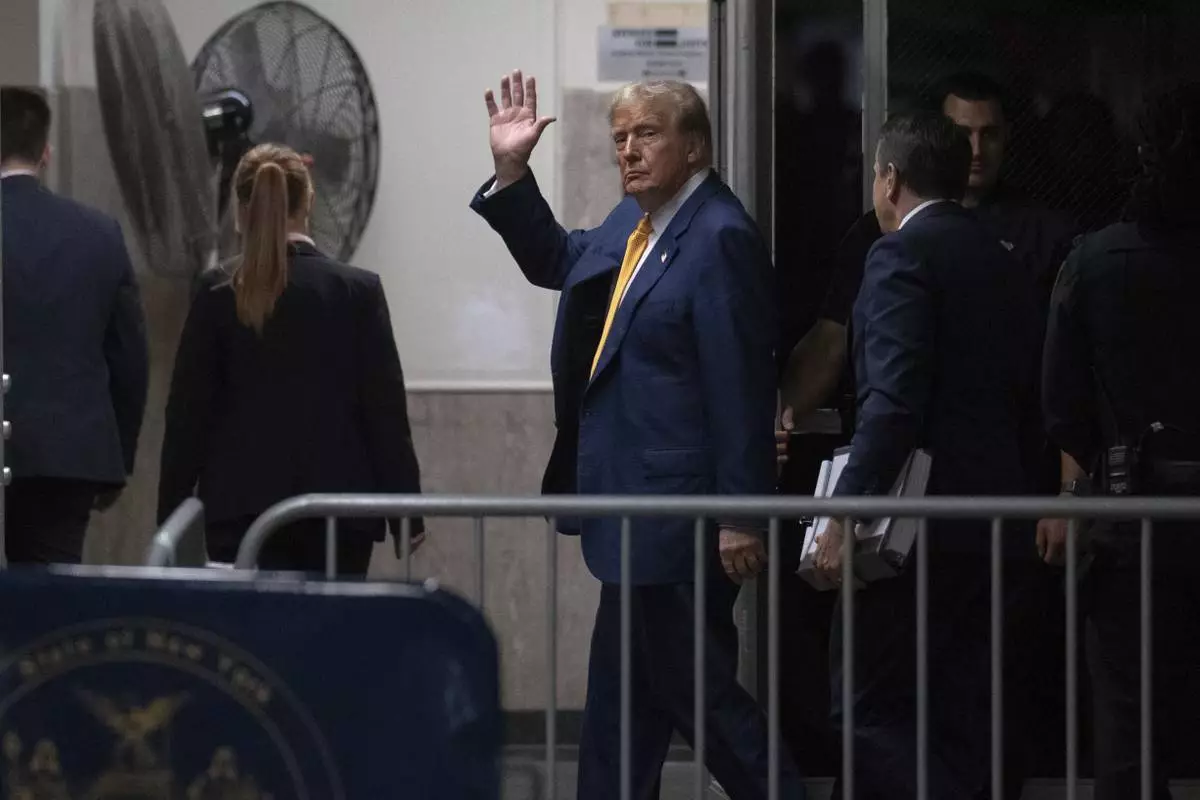
Former President Donald Trump exits the courtroom during a break from his trial at Manhattan criminal court in New York, Thursday, May 2, 2024. (Jeenah Moon/Pool Photo via AP)
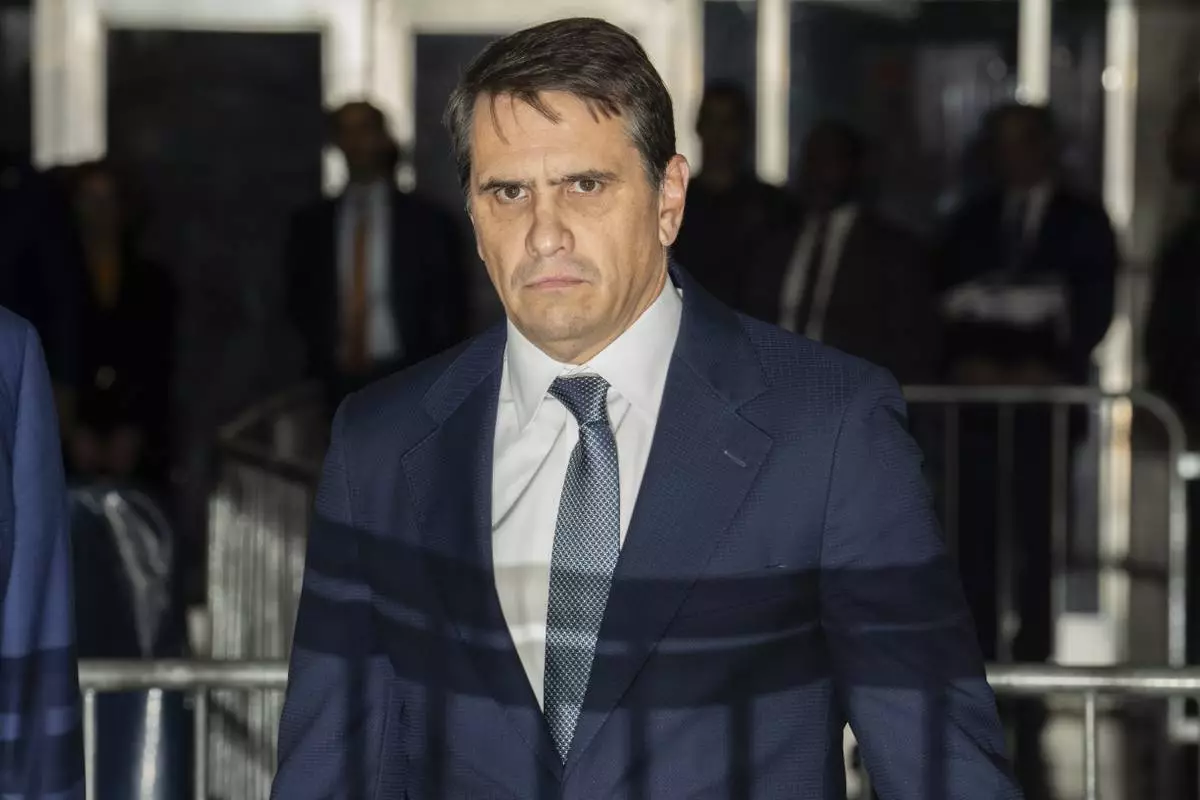
Todd Blanche, attorney for former President Donald Trump, arrives at Manhattan criminal court in New York, US, on Thursday, May 2, 2024. (Jeenah Moon/Pool Photo via AP)
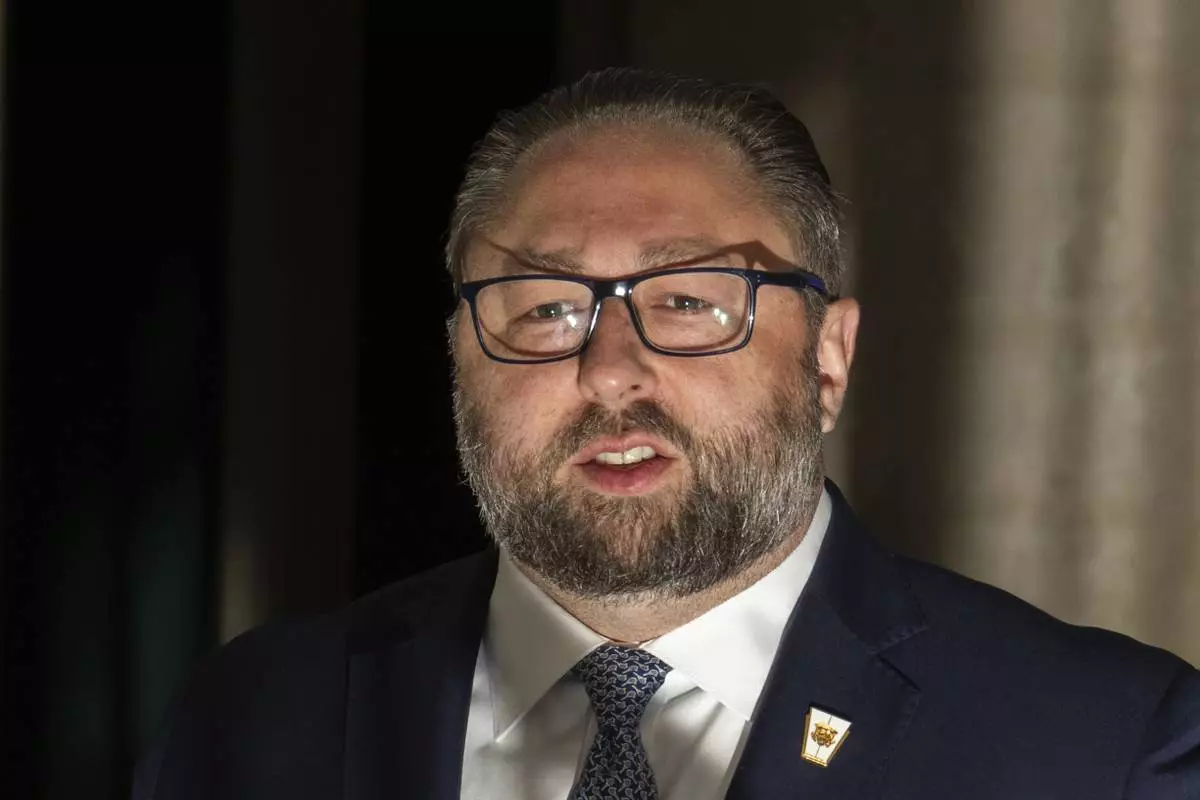
Jason Miller arrives at Manhattan criminal court before the start of former President Donald Trump's trial in New York, Thursday, May 2, 2024. (Jeenah Moon/Pool Photo via AP)
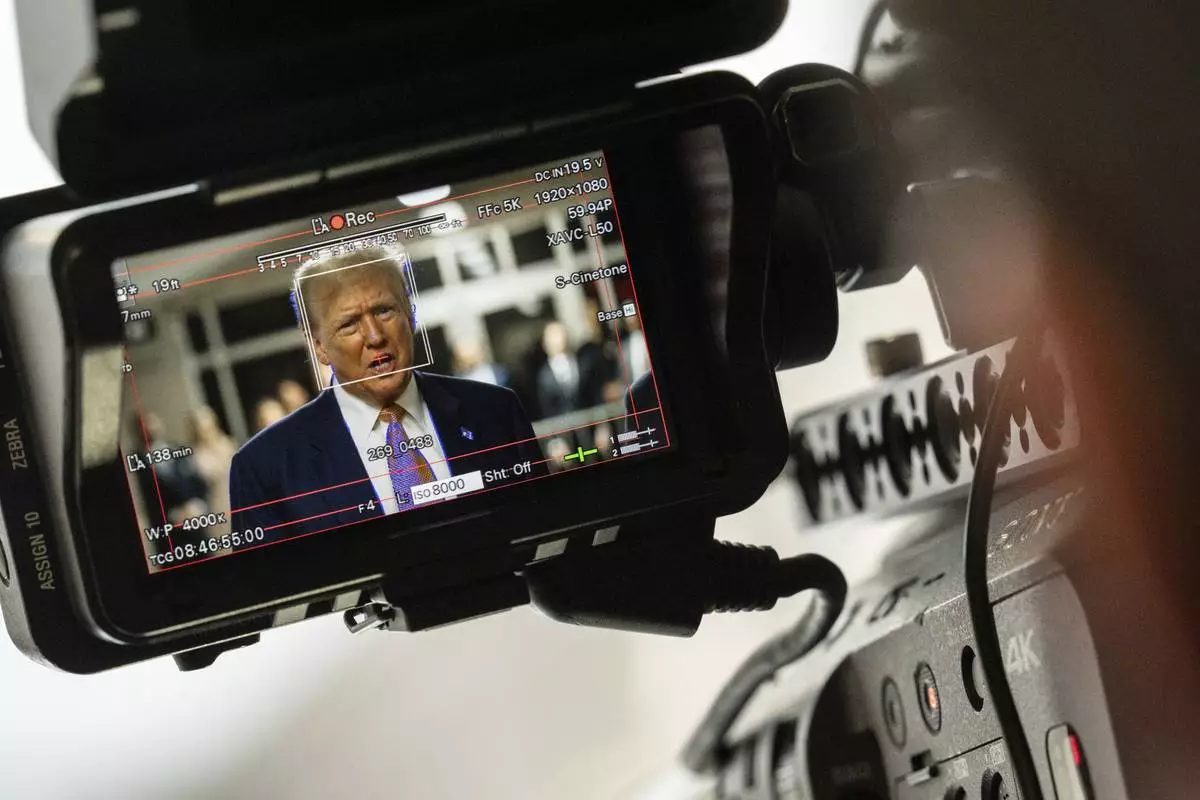
Former President Donald Trump, seen through a camera viewfinder, speaks to members of the media at Manhattan criminal court in New York, on Thursday, May 2, 2024. (Jeenah Moon/Pool Photo via AP)
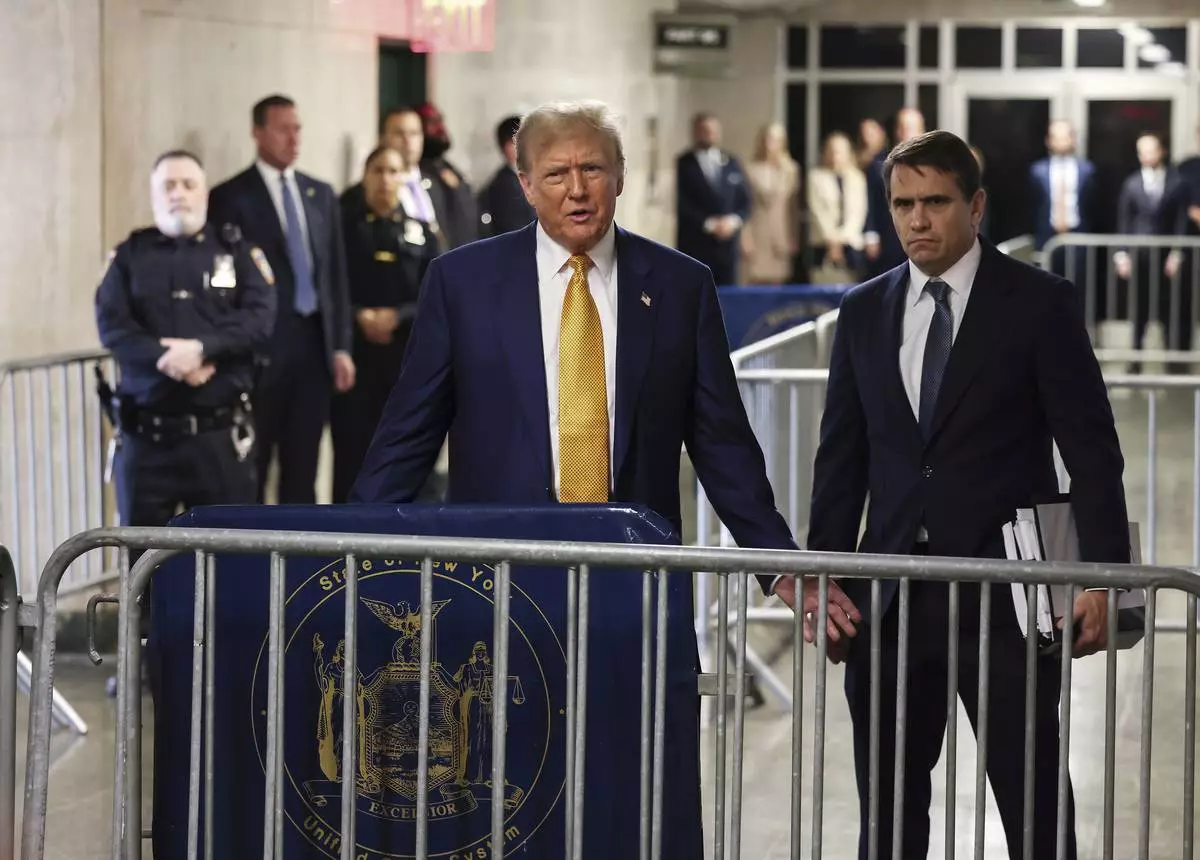
Former President Donald Trump arrives at Manhattan criminal court before his trial in New York, Thursday, May 2, 2024. (Charly Triballeau/Pool Photo via AP)
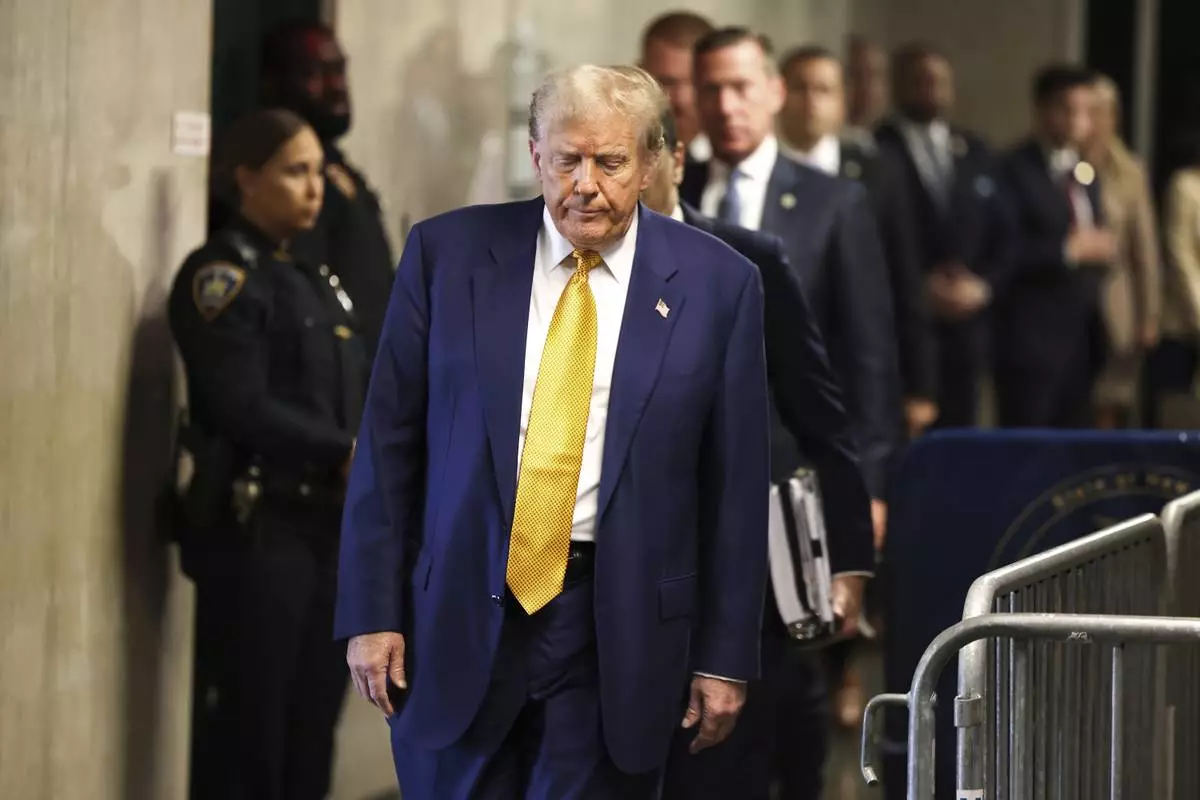
Former President Donald Trump arrives at Manhattan criminal court before his trial in New York, Thursday, May 2, 2024. (Charly Triballeau/Pool Photo via AP)
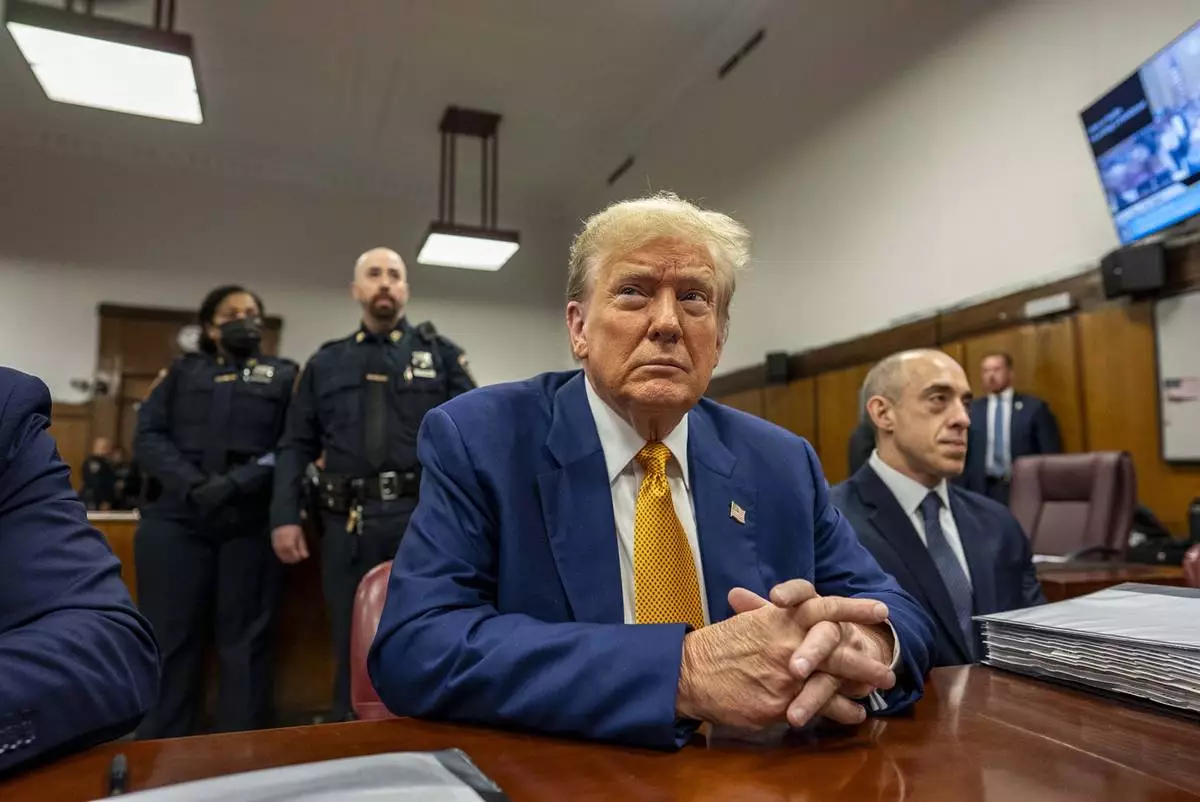
Former President Donald Trump sits inside Manhattan Criminal Court, Thursday, May 2 2024. (Mark Peterson/Pool Photo via AP)
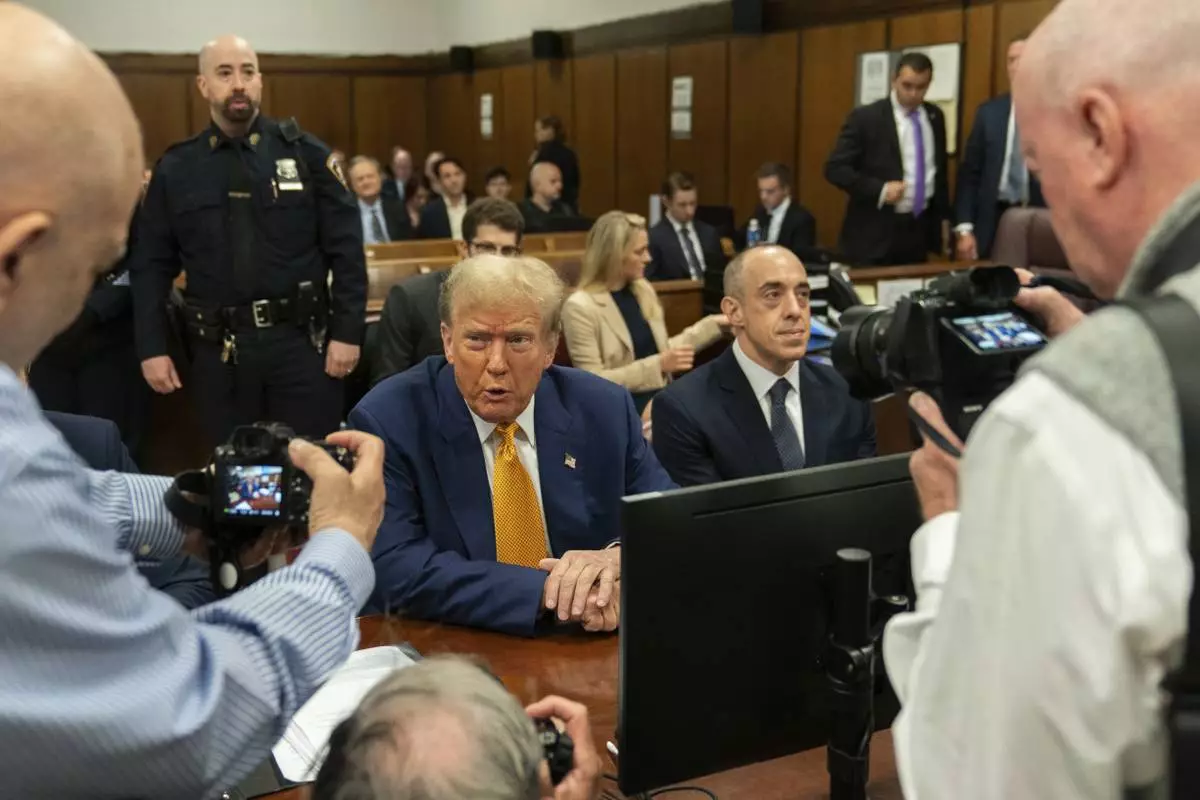
Former President Donald Trump appears at Manhattan criminal court before his trial in New York, Thursday, May 2, 2024. (Jeenah Moon/Pool Photo via AP)
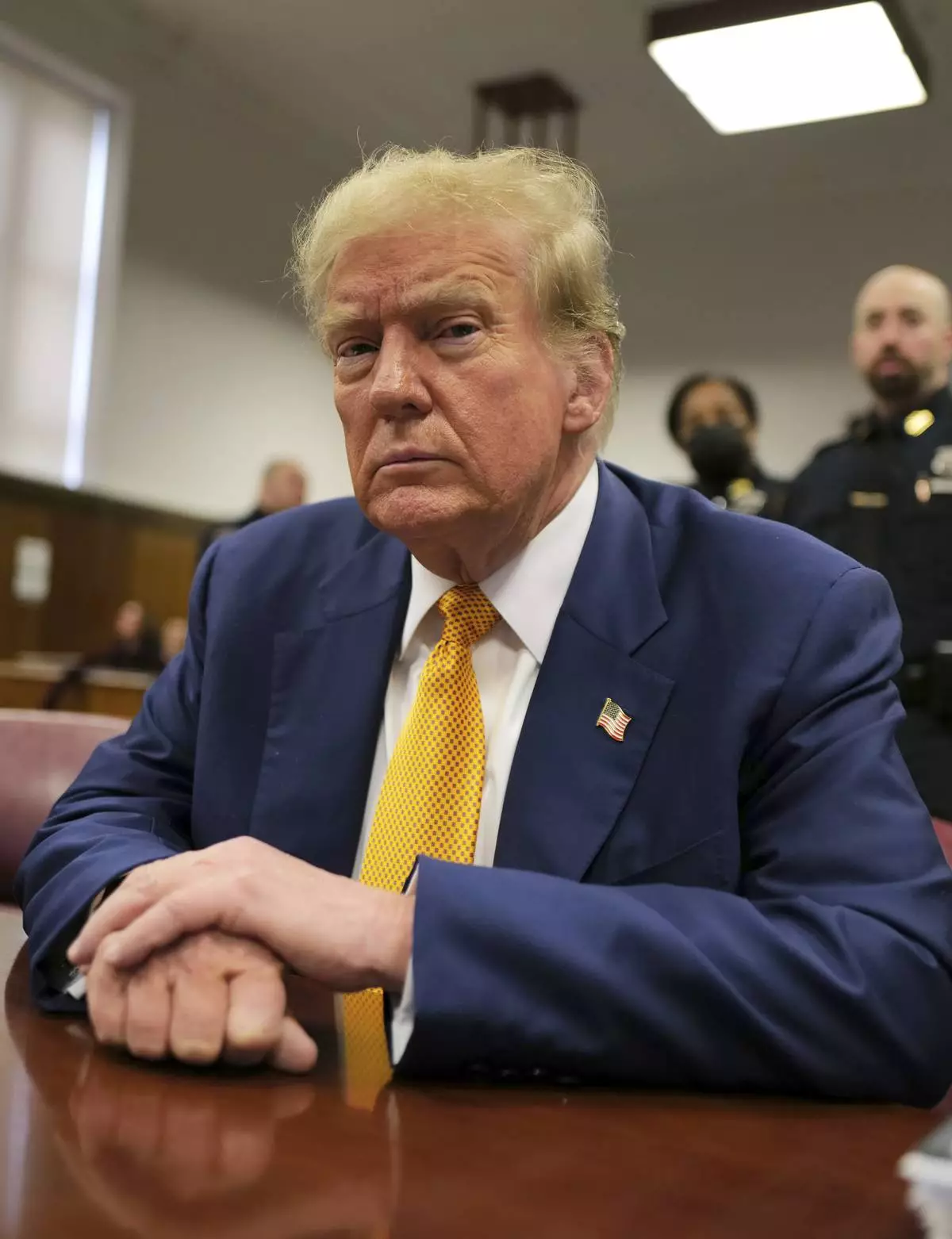
Former President Donald Trump appears at Manhattan criminal court before his trial in New York, Thursday, May 2, 2024. (Charly Triballeau/Pool Photo via AP)

Former President Donald Trump walks outside the courtroom of his trial at Manhattan criminal court, Tuesday, April 30, 2024, in New York. (Curtis Means/Pool Photo via AP)
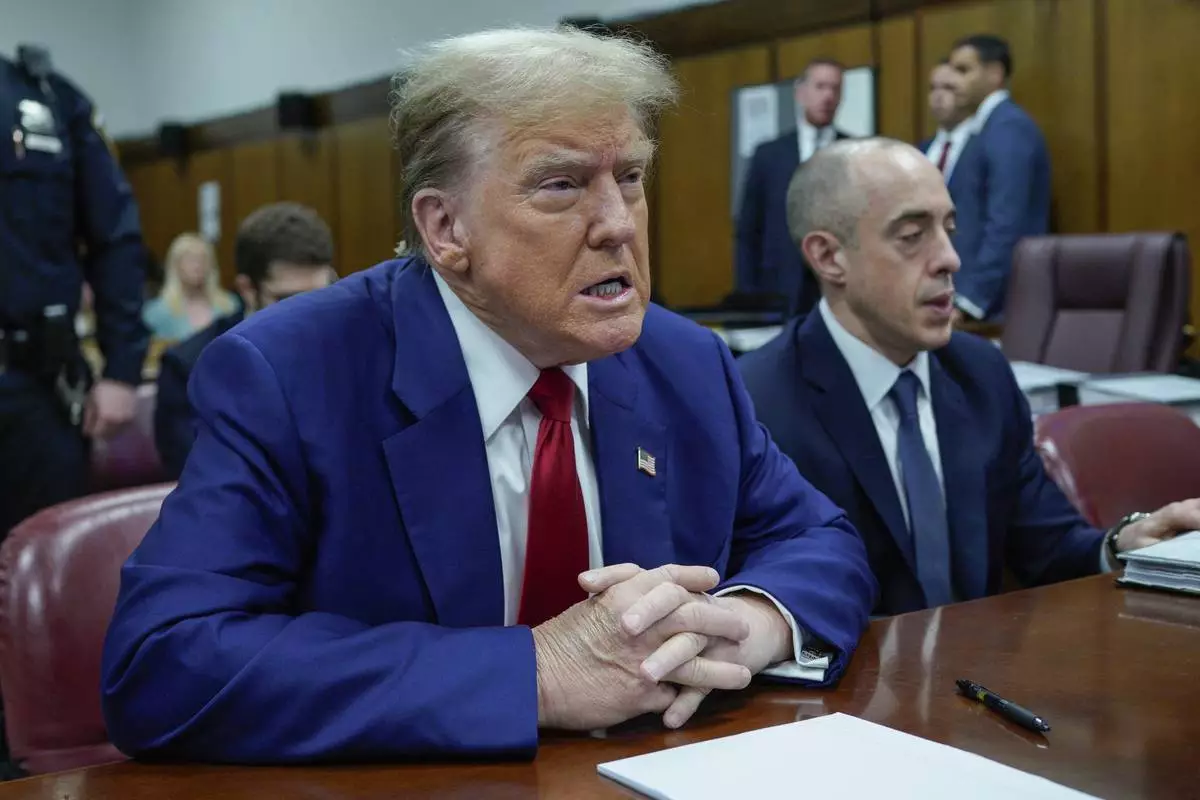
Former President Donald Trump awaits the start of proceedings at Manhattan criminal court, Tuesday, April 30, 2024, in New York. (Eduardo Munoz/Pool Photo via AP)
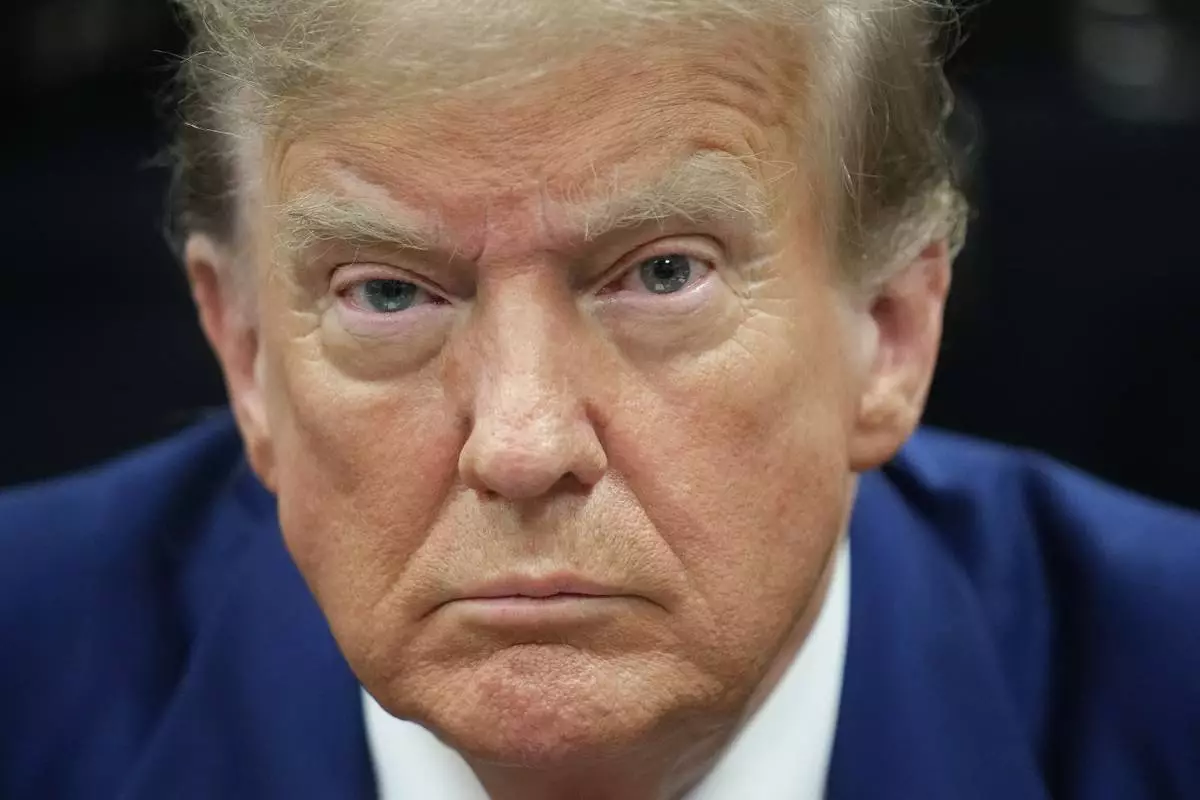
Former President Donald Trump awaits the start of proceedings at Manhattan criminal court, Tuesday, April 30, 2024, in New York. (AP Photo/Seth Wenig, Pool)
















